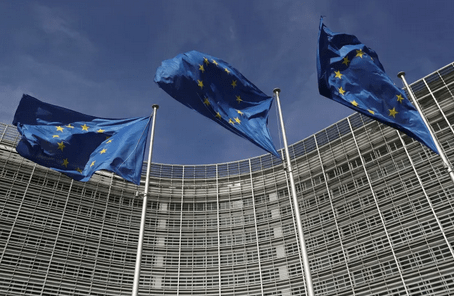
European Union continues to support NGOs designated terrorist affiliates
The European Union and Palestinian NGOs have been working together to offset losses caused by Israel designating six of the NGOs as terrorist groups, under the guise of battling the “shrinking space for civil society organizations” among Palestinians, according to a document obtained by The Jerusalem Post.
“EU and member states have continued to engage with the six designated organizations collectively showing solidarity both at technical level and [head of missions] level,” the minutes of a January 21 meeting between the EU Representative to the Palestinians and other European officials with Palestinian civil society leaders said.
The meeting took place following Defense Minister Benny Gantz’s decision in October to ban six Palestinian organizations – Addameer, Al Haq, Bisan Center, Defense for Children International-Palestine (DCI-P), Union Of Agricultural Work Committees (UAWC) and the Union of Palestinian Women’s Committees (UPWC) – due to their affiliations with the Popular Front for the Liberation of Palestine, a designated terrorist group in Israel, the US, the EU and elsewhere.
Among the ways Israel demonstrated that connection was a video of leading figures in the NGOs, including Khaleeda Jarrar and Abdullatif Ghaith of Addameer, Shawan Jabarin of Al-Haq, Gebril Muhamad of Bisan, and Ahmad Saadat of the UPWC, at a PFLP event.
EU Representative Sven Kühn von Burgsdorff briefed the attendees on the designation of the NGOs, “reiterating the EU core belief that civil society is an essential part of a pluralistic and functioning democracy, particularly important in Palestine where the democratic processes are not in place… and civil society is constantly attacked by Israel.”
Referring to those taking Israel’s designation seriously, the meeting’s minutes state that “some players (including the EU) were holding a minority position that seemed to be currently contributing to the shrinking space for civil society.”
Contracts with Al Haq and the Palestinian Center for Human Rights, which ran an EU-funded project with some of the banned NGOs, were suspended because of Israel’s accusations last year, even before the official designation.
They were cleared by the European Anti-Fraud Office, but the suspension of funding, direct and indirect, remained in place. The full investigation would likely take six more months, the document published in January stated.
Kühn von Burgsdorff “could not continue suspending forever the [funding to] PCHR and Al Haq every time Israel came up with new allegations and promises to submit new proof,” the document read.
The office of the EU Representative hired an Israeli firm to analyze legal repercussions of the designation for its staff and that of NGOs.
The Kühn von Burgsdorff and the Palestinian NGO Network (PNGO) decided that the EU would quietly show its support for the six NGOs under the guise of Palestinian civil society writ large at a PNGO conference on “the shrinking space for civil society organizations” on February 1.
The EU Representative’s Office “brought forward the suggestion to explore the possibility of a joint statement on European support to [civil society organizations]… It would not make specific reference to the designation but it could be issued on the occasion of the PNGO conference.”
In the press release from the February 1 conference, an EU-funded project called “Shoraka” to “present and discuss the trend of shrinking space for [civil society organizations] within the Palestinian context” was announced.
The Shoraka program received 588,299 Euros from the EU with the objective “to advance the role of the Palestinian civil society and the Palestinian grassroots in the policy shaping and in decision-making processes at the local and EU/[EU member state] levels,” which would include an effort “to amplify the Palestinian narrative and the effectiveness of Palestinian advocacy efforts in the EU,” stated an EU document listed by the International Aid Transparency Initiative.
Kühn von Burgsdorff said at the conference that “civil society organizations are… the engines of change, the ones on the frontlines, fighting for equality and justice. In Palestine, the EU is proud of its partnership with the Palestinian civil society organizations as they continue to play a major role in promoting international law, human rights, and democratic values.”
“This partnership is demonstrated by around fifty ongoing projects with a total budget of almost seventy million Euros,” he added.
Among the topics discussed at the conference with the EU representative, according to the PNGO website, were “the strategies and mechanisms needed to combat counter-terrorism policies.”
The meeting with the EU Representative and the PNGO conference did not mention Palestinian Authority President Mahmoud Abbas’s presidential decree restricting the activity and finances of Palestinian civil society organizations. However, PNGO has called Abbas’s moves to freeze Palestinian NGOs’ bank accounts “a vicious attack.” Al Haq said the decree “infringes on the pillars of transparency and openness to civil society.”
Itai Reuveni, Director of Communications for NGO Monitor, which studies the funding of civil society organizations, said that “the statements from European officials are further proof of how deeply governments are invested in terror-tied NGOs, looking for any excuse to keep funding them and using use them as policy sub-contractors.
“The fact that the EU would fund a BDS and terror-linked NGO to run a project aimed at ‘promoting the Palestinian narrative’ and ‘combating counter-terrorism policies’ highlights the absurdity and negative impact of the EU-NGOs echo chamber,” Reuveni added.
Source: JP





